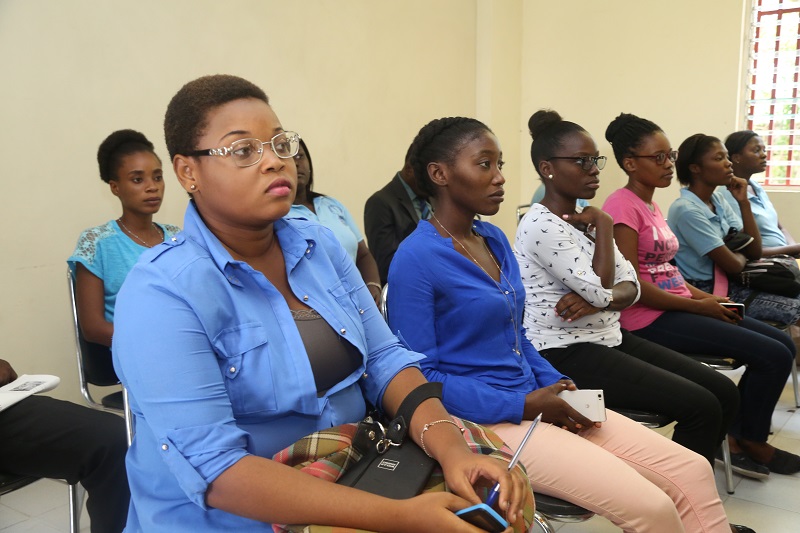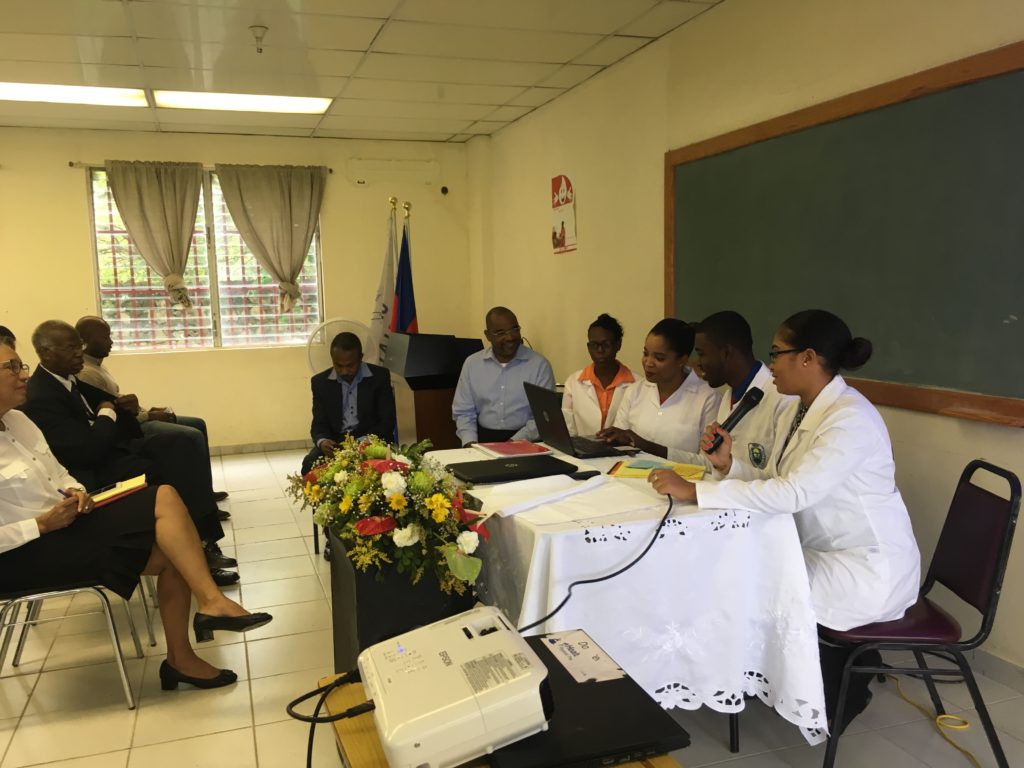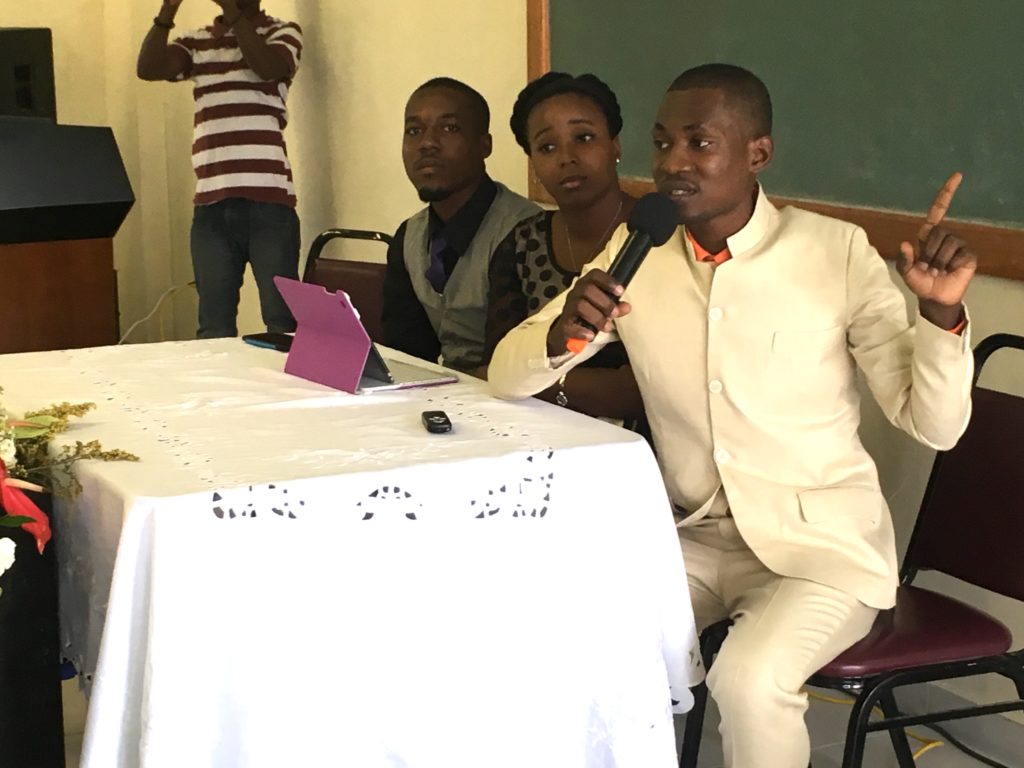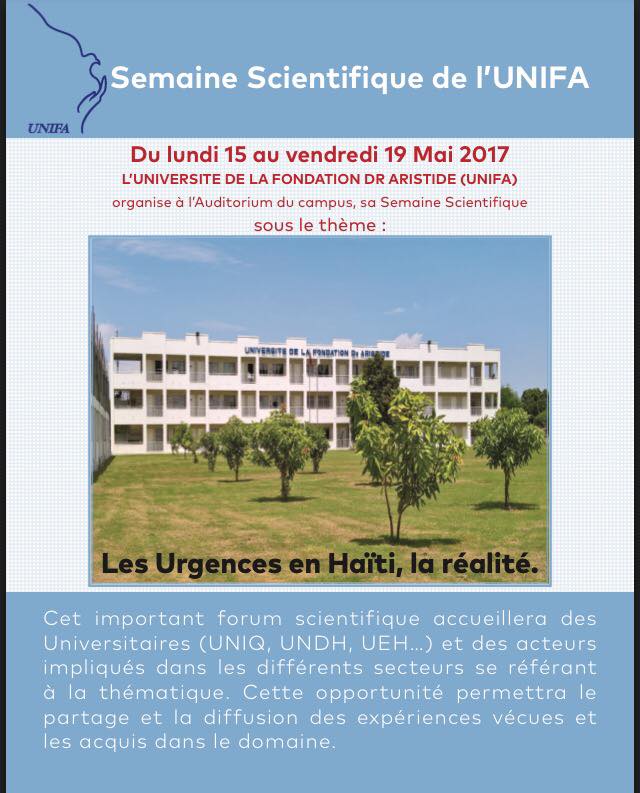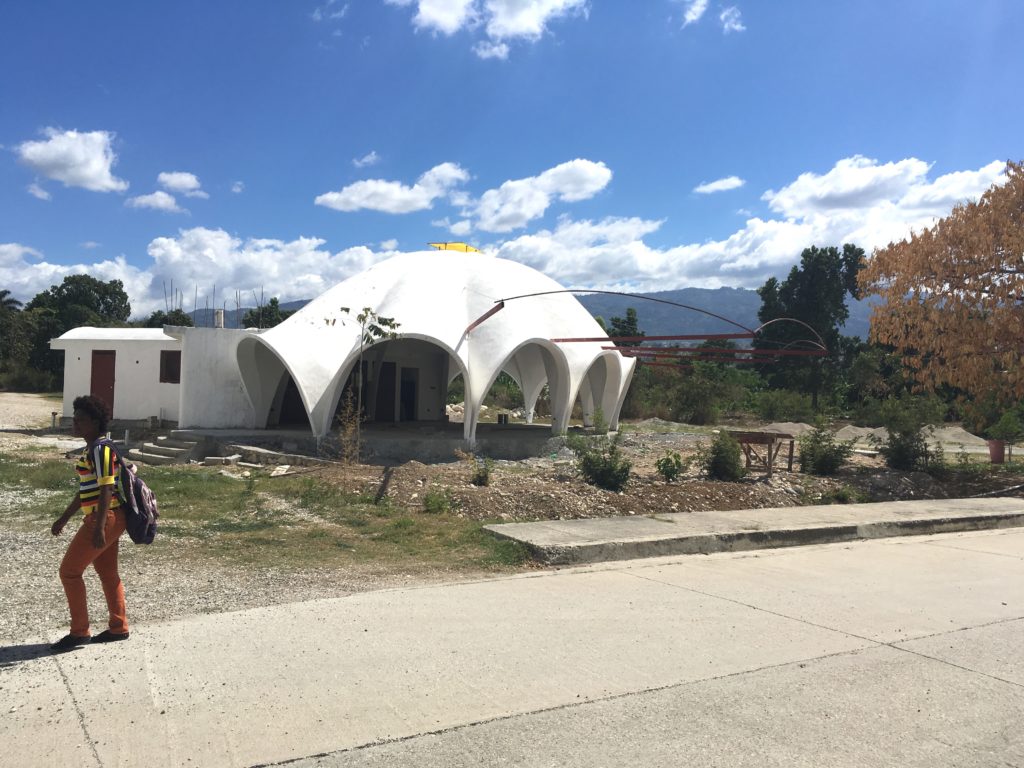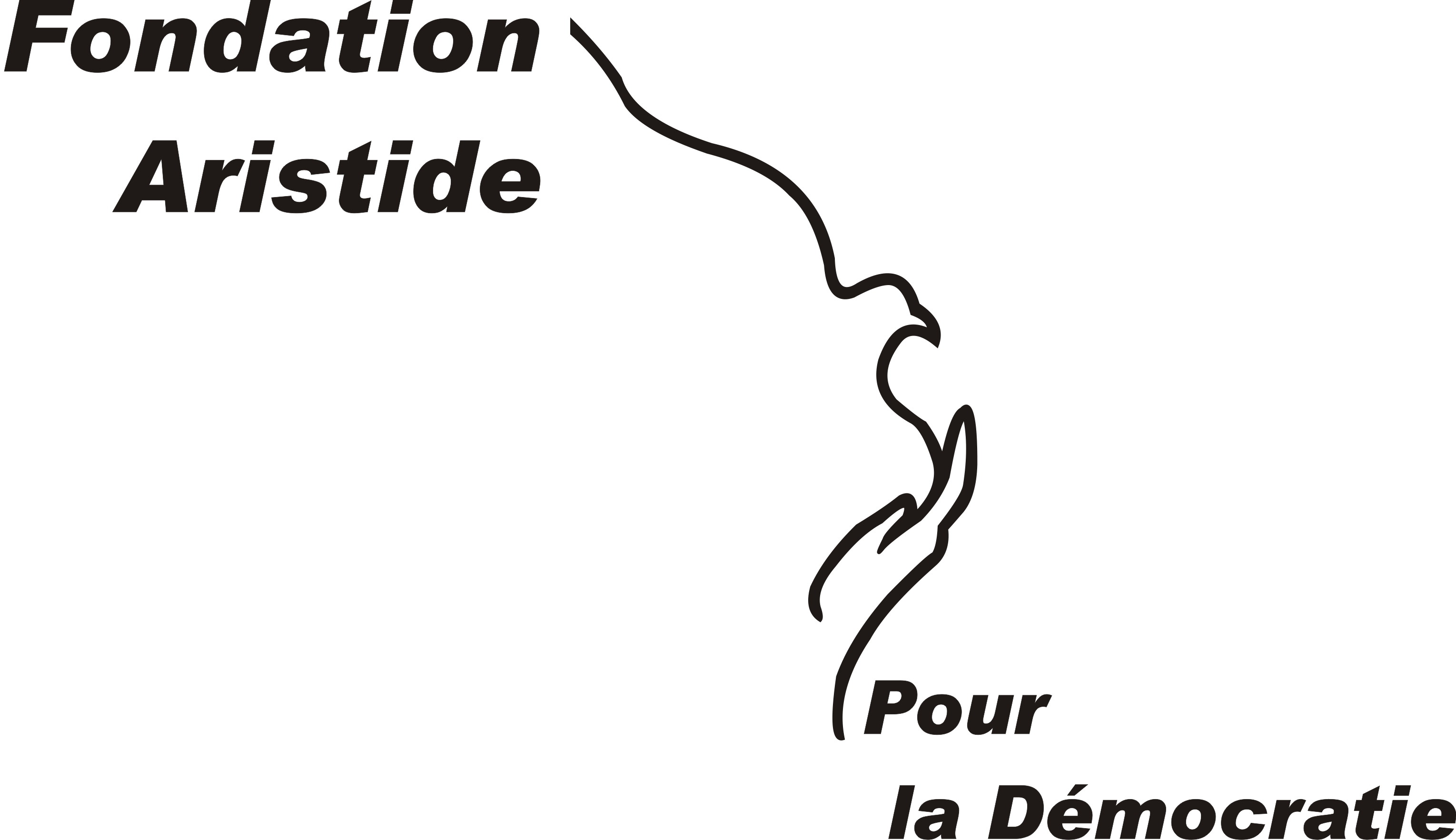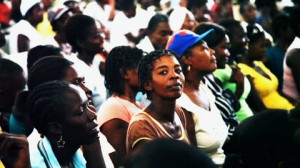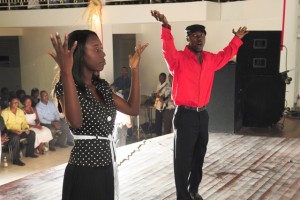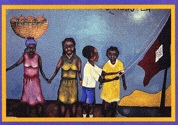UNIFA, the University of the Aristide Foundation, June 2017 Newsletter
UNIFA needs your help to complete construction of its Diagnostic & Primary Care Center. Please DONATE today!
As the 2016-17 academic year draws to a close, here is an update of another year of challenges and progress achieved through the hard work of our professors, students, support staff, academic leadership, Board of Administration and you, Friends of UNIFA.
Hurricane Matthew
We opened the year against the backdrop of a category 4 hurricane, Matthew: the worst storm to strike Haiti in more than 50 years, the worst natural disaster since the 2010 earthquake. The number of people killed is estimated at upwards of 1,400. Up to 80% of the homes and buildings in the south and southwest region of the country were damaged. Cities were flooded, bridges and roads washed away, livestock and harvest lost. The landscape forever altered. A region of 2 million people, rich in fruit trees and agricultural production was left unable to produce food. A week after the storm, President Aristide visited some of the hardest hit areas, bringing the Foundation’s contributions of food, clothing and emergency kits. UNIFA stepped in to offer scholarships to affected high school seniors, and in January welcomed 35 students to live in available campus housing for the spring semester. All fees were waived.
UNIFA Offers Two New Disciplines
Last year groundwork was laid for opening the School of Engineering. A dean was appointed to head the department, begin recruitment, and oversee a four month pre-engineering course for prospective students. In October, 59 students enrolled in the four year program. Currently, the two concentrations available are computer science and civil engineering. At the end of this spring semester, an electrical engineer was appointed to design a third program in renewal energy.
Until this year the State University had the only accredited School of Dentistry in Haiti. But with only an average of 25 graduates a year, the number of dentists for a population of 10 million plus, is unacceptable. This year UNIFA recruited 39 students for its first class at the School of Dentistry. These students joined medical and physical therapy students in the first year of a two year common core science curriculum.
Sixth Year Medical Internships
In January 2017 the Medical School reached an important milestone with the placement of 72 sixth year medical students in a yearlong rotating internship program at 3 public hospitals: Hopital Universitaire Mirbalais; Hopital Universitaire La Paix; and Hopital la Providence Gonaives. In May a group of interns returned to campus to report on their experiences. They shared the real life challenges of working in under resourced facilities where poor patients are expected to purchase basic items like bandages and syringes. They explained how they confronted – and got around – patients and family members with religious beliefs that could have impeded their receiving care. They ventured beyond the hospital to meet patients in the remotest areas of the country, seeing firsthand the extent of the health care crisis in Haiti. And they learned how to be creative, like befriending a carpenter who offered them unused wood planks that they learned to use as splints.
Anatomy Lab
Another important milestone for the Medical School was achieved with the opening of the anatomy lab in March. Students are now able to perform dissections as part of their anatomy class.
UNIFA has been asked, and has agreed, to make the lab available for use by medical students enrolled in other universities. The lab sits in the south west corner of campus, adjacent to the location dedicated for the university hospital.
Library
Closer to the main hub of campus, next to the auditorium, sits UNIFA’s library. This Spring Semester, a foundational collection of just over 6,000 books were cataloged, labeled with call numbers and shelved. This first phase of the work was led by a trained librarian who headed up a team of 10 people. The second phase will involve the acquisition of more books and computers to offer students access to online sources.
Special Lectures and Conferences
The Law School welcomed several guest lecturers this year. In December, and then again in May, UNIFA VP for Institutional Development Erin Daly gave lectures on international environmental law to 4th year students. Later in December Brian Concannon, director of the Institute for Justice and Democracy in Haiti, briefed law students on the cholera case against the United Nations. After explaining the underlying substantive and procedural issues, Brian focused on the strategy deployed in creating a coalition of grassroots organizations, lawyers, law students, scientists, universities, human rights activists, and the media to bring attention and support to the demand for reparation and damages for the victims of this injustice.
In early March, UNIFA human rights lecturer Nicole Philipps hosted USC Hastings Law Professor Christen Lin and 5 Hastings students, in her first year human rights class. The presentation centered on the legal basis for recently signed US executive orders on immigration. The Hastings students led a discussion on the different ways that lawyers and rights training can empower immigrants and citizens against wrongful action by the state. The following week a delegation of Haitian American students from Howard Law School joined first year UNIFA law students in discussions on issues surrounding environmental law.
In April UNIFA commemorated the 214th anniversary of Toussaint Louverture’s death with a university-wide conference on Toussaint’s legacy.
Semaine Scientifique (Science Week)
May 15-19, UNIFA hosted its third annual weeklong conference series under the unifying theme: The reality of emergency in Haiti. Invited guest lecturers included the head of the emergency department at a UNIFA partner institute, as well as other noted physicians experienced in emergency care in under-sourced and staffed health care facilities. It was clear, that blame for the record high incidences of medical emergencies in Haiti, are attributable to poverty.
But the week’s 15 lectures were not confined to health care. Topics addressed ranged from the environmental crisis; handicap access; fire safety; ecosystem and land management; energy production; and education.
Rightfully, emphasis was placed on the environment. Currently, Haiti is the third most vulnerable country at risk of climate change damage. One professor of agronomy from the State University explained how better protection of the country’s water catchment areas, mangroves, and vegetal coverage can minimize the impact of natural catastrophes.
While in another presentation, an entire overhaul and rethinking of land management and use in Haiti – particularly in the capital – was advocated. Roots of some aspects of the problem were traced to 3 historical factors: (1) the construction of colonial cites on the coast in order to facility the slave economy; (2) deforestation over enormous tracks of land to build sugar, indigo and cacao plantations; and (3) the forced payment of the 150 million gold franc debt to France through the sale of the country’s precious wood.
Joel Vorbe and entrepreneur Emmanuel Desquiron shared their challenges as individuals living with physical handicaps in a country ill equipped to accommodate them. Beyond access ramps and elevators, both urged students to consider professions where innovation, treatment and new research can help change the quality of lives for all Haitians living with mental or physical disability.
The week was also an opportunity to invite the Haitian Red Cross to organize a blood drive on campus and offer first response training to students.
The conference series closed with a presentation by the Rector of Université Quisqueya. He offered a sweeping look at a broad range of social, economic, and environmental indices in Haiti – all of which point to a country in need of critical thinking to tackle the emergencies afoot. His message to students was to resist a passive or reactive form of emergency planning. To instead engage in a deeper, research based analysis within each student’s chosen area of study.
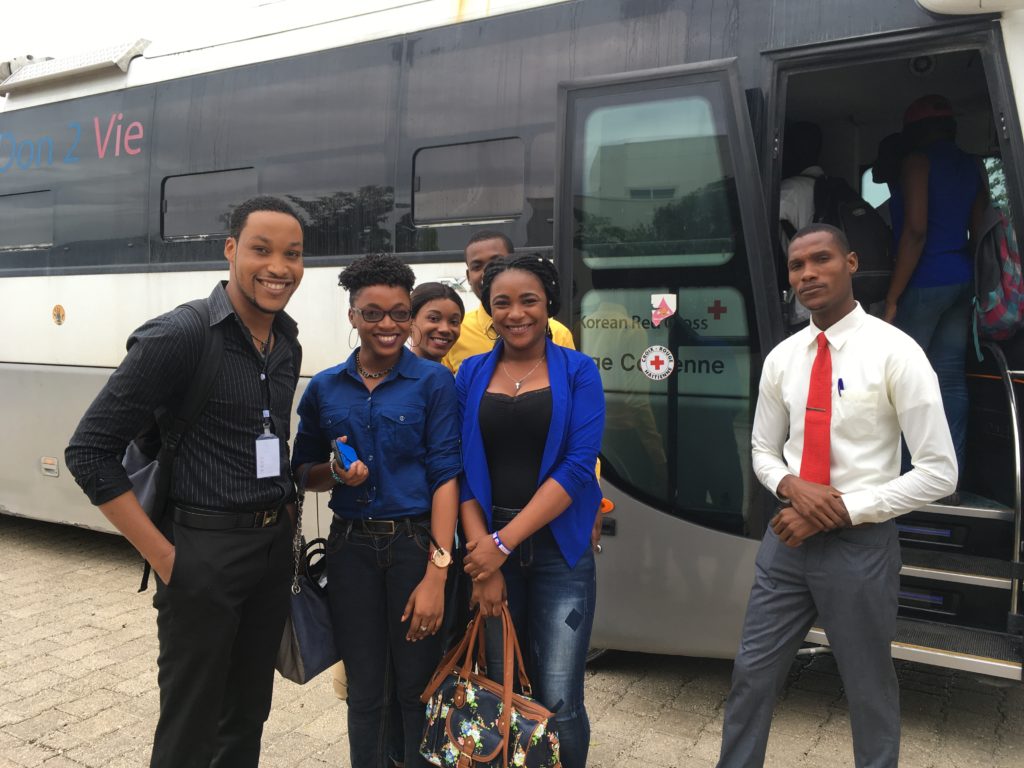
Red Cross blood donation bus visits UNIFA during Science Week. Students volunteered to donate blood.
Community Service
Medical and nursing students participated in three of the mobile clinics organized at the Foundation this year. In the three events combined, upwards of 750 members of the community were able to consult with a physician and receive free medication.
In January, as part of its outreach program, area high school seniors were invited to an open house and discussion on educational opportunities available at UNIFA, followed by a friendly game of football.
School of Continuing Education
From February to June the School of Education offered a certificate course on cellphone and lap top repair at the Foundation. Classes were taught by instructors from the School of Engineering and are open to youth in the community who are not on a university track and to anyone wanting to learn a useful skill.
Civic Education Program
In March, Erin Daly and former UNIFA visiting instructor Patrick Keenan (University of Illinois College of Law) traveled to Haiti with Michael Maya, Director of the International Bar Association – North America (IBA), to explore the possibilities of implementing an IBA funded Civic Education Program. After this onsite visit and further discussions with Ira Kurzban, the IBA and Partnership for Education, Democracy, and Health in Haiti (PEDHH) have reached agreement to fund the program at UNIFA. The primary goal of this initiative is to increase awareness and understanding of basic principles of law and rule of law among the Haitian population with particular attention to Haiti youth. Radyo and Tele Timoun, (the Foundation’s children’s educational radio and television stations) will facilitate execution of this program.
Construction
Five significant construction projects were completed this past academic year:
- A second level to the School of Law building to accommodate the School of Engineering and Research
- A second level to the building that temporarily housed the cafeteria and is now being transformed into the library
- The anatomy lab
- A new cafeteria
- The first phase of a second level to the School of Physical Therapy building which will, in the near future, house the School of Dentistry
Looking Ahead …
Recruitment for next year begins in July. The student population will certainly reach the 2000 mark (we end the year at 1400); new professors and deans will join our ranks; we will continue to keep student fees as low as we can; and UNIFA will continue to strive towards inclusion and excellence in higher education in Haiti. And importantly, we will be one step further in attaining our long term goal of founding a university teaching hospital.
Visit www.FriendsofUNIFA.org website
